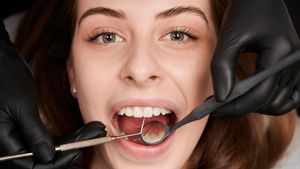JAKARTA - Food coma or in medical terms "postprandial somnolence," is a condition in which a person feels very sleepy or tired after eating.
This happens because the body diverts blood flow to the digestive system to digest food, which can cause a decrease in energy and drowsiness.
Although drowsiness after eating is common, this can cause discomfort when you have to work or study.
In fact, this is dangerous if you need to drive or do risky activities. Here are 6 tips for overcoming food coma, as reported by VOI from the Healthline page on Tuesday, November 26, 2024.
Eating in large portions is associated with drowsiness, so maintain a medium portion and pay attention to the level of comfort. Choose a balanced diet. A study of truck drivers in Brazil found that those who eat low-fat animal foods, processed foods, and alcohol experience less drowsiness while driving than those who eat unhealthy foods.
Alcohol can cause you to want to always sleep. This interferes with sleep at night, causing fatigue during the day. If you drink alcohol while eating, you may feel more sleepy.
Dehydration causes fatigue and interferes with mental function, so make sure you drink a lot of fluids, including water, tea, and milk throughout the day.
SEE ALSO:
Bad night's sleep can exacerbate the decline in energy levels naturally in the afternoon, so try to sleep 7-8 hours per night.
Bright light exposure is shown to reduce the effects of sleepiness after lunch. Using bright light may be very helpful in the office or work environment and other learning to prevent drowsiness after eating.
A 30-minute short nap can help restore brain performance, so instead of fighting the effects of a food coma, a short nap might help.
The English, Chinese, Japanese, Arabic, and French versions are automatically generated by the AI. So there may still be inaccuracies in translating, please always see Indonesian as our main language. (system supported by DigitalSiber.id)

















